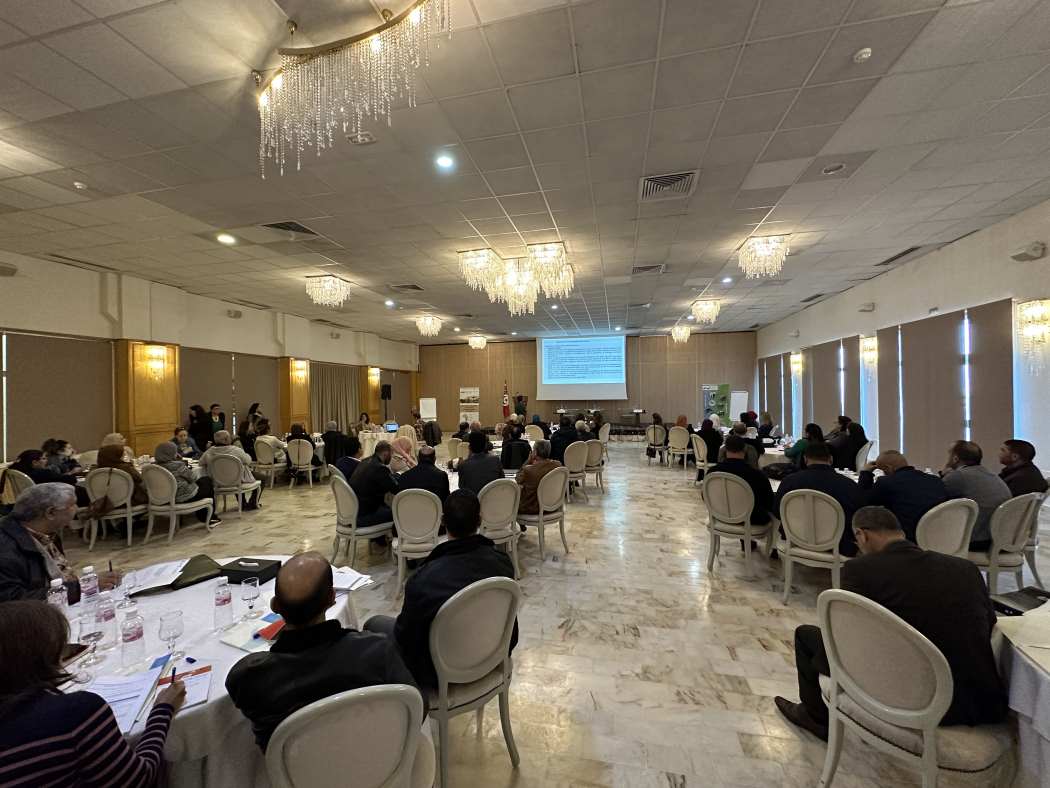On 25th November 2022 at the Hotel Le Palace Gammarth in Tunis, more than 75 participants including the Minister and the surface water director at the General Directorate of Water Resources of the Ministry of Agriculture and Hydraulic Resources of Tunisia (MARHP), the representative of the European Union delegation in Tunisia, institutional actors from the water, climate and gender sectors, civil society, journalists and academia, attended the National Conference of the Africa Water Investment Programme: Gender Equality in Water Security and Climate Resilient Development in Africa (AIP WACDEP-G).
Organised by GWP-Med and the General Directorate of Water Resources of the Ministry of Agriculture, Hydraulic Resources and Fisheries of Tunisia (DGRE), the Conference signals the completion of the first three years (October 2020-December 2022) of implementation in Tunisia of the Austrian Development Agency funded programme AIP WACDEP-G.
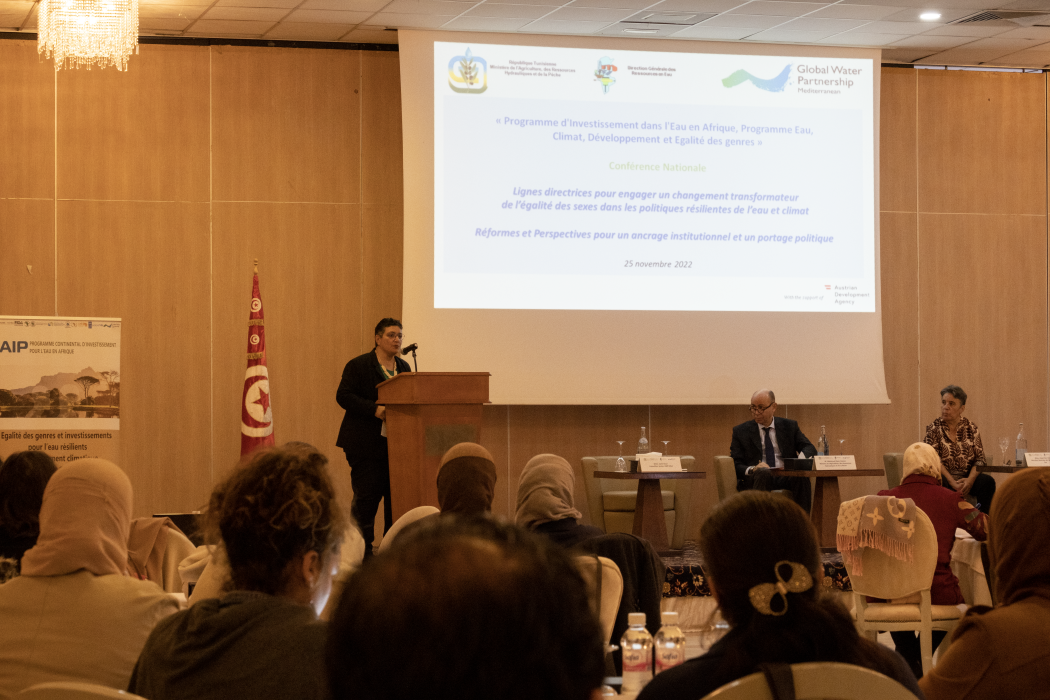
More than 75 participants attended the National Conference of the Africa Water Investment Programme: Gender Equality in Water Security and Climate Resilient Development in Africa (AIP WACDEP-G).
The National Conference’s goal and results achieved
Its overall goal was to present, discuss and validate reform guidelines for transformative change in gender equality in water and climate resilient policies in the country and to discuss the gender action plan, one of the project’s key documents. Moreover, the Conference aimed to engage policy makers to catalyse gender transformative change in power relations and institutional structures for implementation of climate-resilient water investments, policies and plans.
Specifically, participants were updated on:
- the AIP WACDEP-G Tunisia project and progress to enhance water security for better resilience to climate change,
- the results of the “Political Economy Analysis” (PEA), produced under the project to study the interlinkages of water, climate, gender and development in Tunisia to understand and regularly monitor power dynamics and
- the guidelines for initiating gender-transformative change in resilient water and climate policies, the main reforms and the gender action plan produced in the framework of the project.
Moreover, throughout the Conference participants discussed:
- the perspectives for institutional anchoring and political support for the reforms and the action plan by the three key ministries relevant to the project’s goals and
- how financial mechanisms could ensure the paradigm shift to embrace gender equality
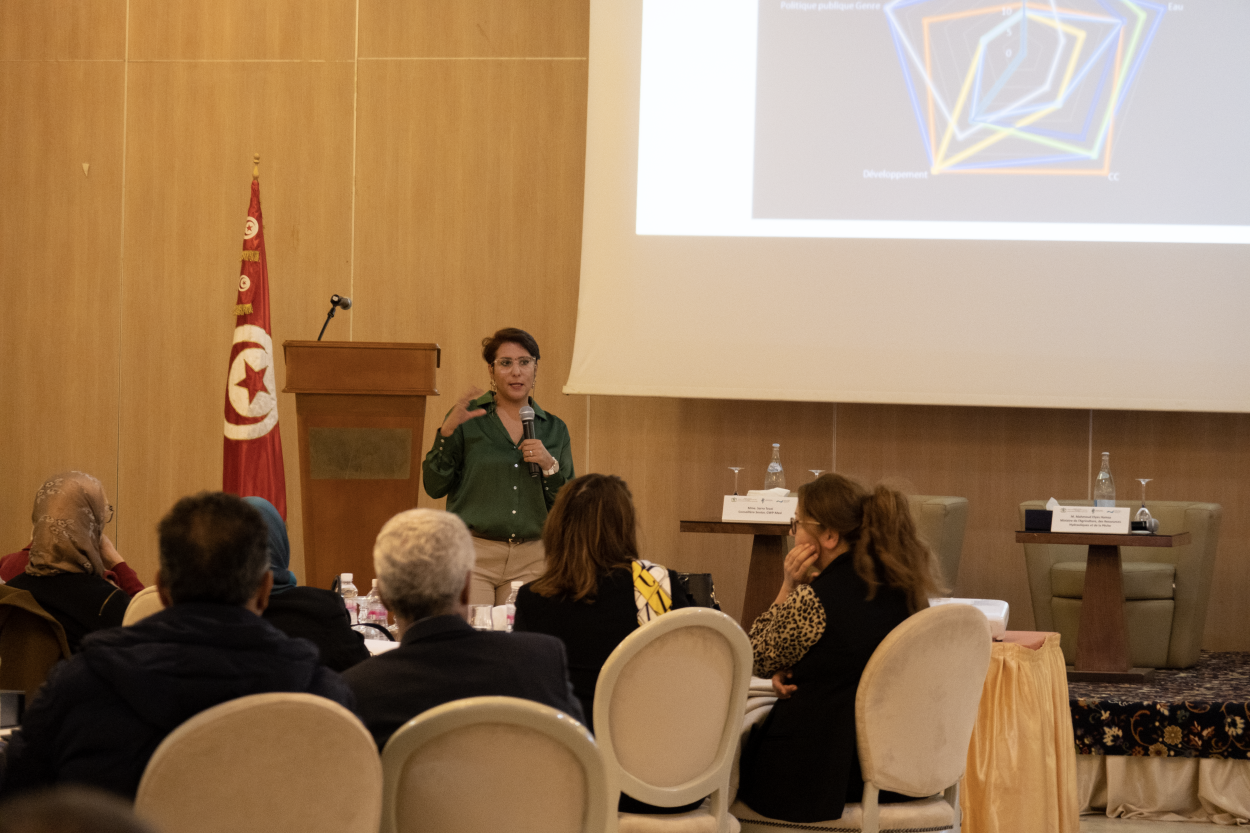
The Conference aimed to engage policy makers to catalyse gender transformative change in power relations and institutional structures for implementation of climate-resilient water investments, policies and plans.
Esteemed Guests
Ms. Hayet Ben Mansour, Surface Water Director at the General Directorate of Water Resources, Ministry of Agriculture, Hydraulic Resources and Fisheries
At her opening speech Ms. Ben Mansour, warmly greeted participants and expressed her gratitude for 20 years of collaboration between the Ministry and GWP-Med on water issues. Ms. Ben Mansour acknowledged that the Ministry has fully embraced the project and withing its framework, the DGRE has been working on gender with various institutions in Tunisia and GWP-Med. Furthermore, Ms. Ben Mansour also added that those who participated at the AIP WACDEP-G’s capacity building trainings have significantly developed their competencies on issues related to gender, water and climate change.
Dr. Sarra Touzi, Senior Advisor Global Water Partnership Mediterranean GWP-Med
Dr. Touzi highlighted that the 9th session of the World Water Forum, signalled the launch of the International High-Level Panel for Water Investment in Africa under the chairmanship of Macky Sall, President of Senegal. Its objective is to mobilize 30 billion dollars per year until 2030, to implement the AIP programme and fill the existing investment gap in the water sector in Africa, estimated at $11-19 billion by the African Ministers' Council on Water (AMCOW). Finally, she praised the commitment of the national and local working groups as well as the presence of the Minister because it sets the political tone to adopt the reforms proposed within the framework of AIP WACDEP-G.
Mr. Mahmoud Elyes Hamza, Minister of Agriculture, Hydraulic Resources and Fisheries (MARHP)
Mr. Hamza stated that “This Water-Climate-Gender triptych is indeed at the heart of the action of the c. It is undeniable today that the first sector that will be impacted by climate change in Tunisia is the water sector. Today, in the face of the climate emergency and social demands, we need to accelerate our action to achieve gender equality, ensure water security for all and the fulfilment of human rights.”
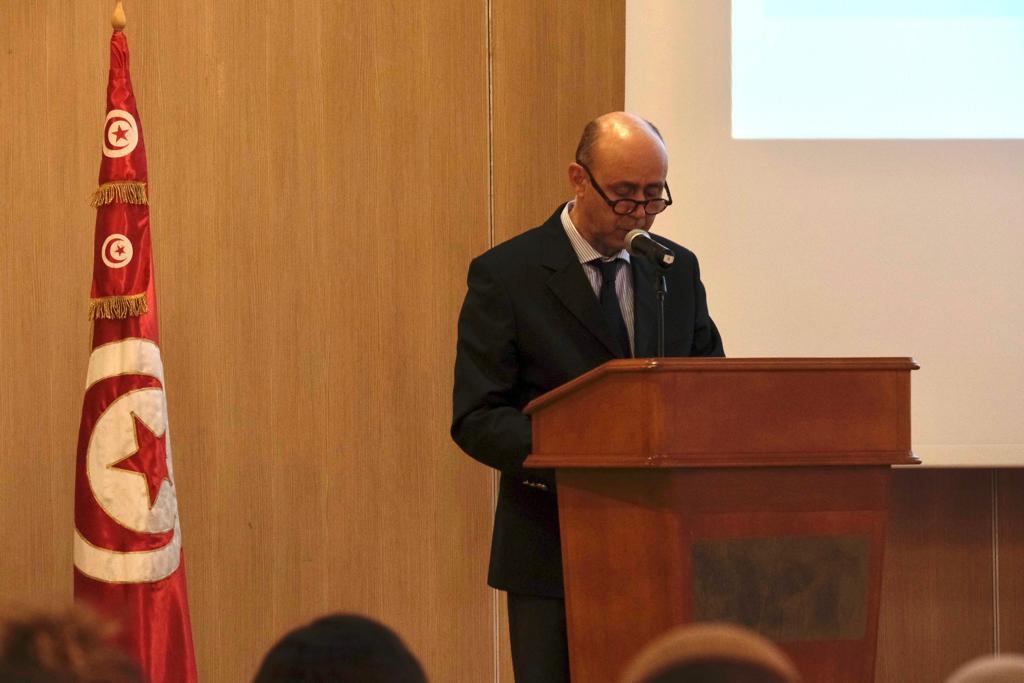
Mr. Mahmoud Elyes Hamza, Minister of Agriculture, Hydraulic Resources and Fisheries stated that “This Water-Climate-Gender triptych is indeed at the heart of the action of the Ministry of Agriculture, Hydraulic Resources and Fisheries.
Statements from the attendees
Ms. Najla Khalfoun subdirector at the General Directorate of Water Resources, Ministry of Agriculture, Hydraulic Resources and Fisheries
Ms. Najla Khalfoun pointed out that “the gender-related water, climate and development in African projects is being implemented to tackle social norms and sexist behaviour. In Tunisia, women have limited access to resources such as land and property rights, clean drinking water, and unequal access to income and economic opportunities. In addition, women do not participate in decision-making in water resources management, although in their daily lives they are primarily responsible for fetching water, farming as well as taking care of the hygiene of the whole family. Therefore, the key institutional actors in charge of water under the Ministry of Agriculture, CRDA Beja, the Ministry of the Environment and the Ministry of Women, Family, Children and Seniors wanted to integrate the transformative gender approach in the policies aiming to promote climate change resilience in the water sector. To ensure and succeed in this gender action plan, which is based on institutional and regulatory reforms, we need political support. In fact, we are not looking for equality between men and women, we are looking for women to enjoy their rights and ensure the eradication of all forms of sexist discrimination”.
Ms. Awatef Laarbi Messai, Director of Quality of Life at the Ministry of the Environment
Ms. Awatef Laarbi Messai stated that “For the gender transformative approach, I think this is a first because we are used to addressing challenges faced by women in rural areas and talking about gender. But this time, it is an approach that has targeted the institutional aspect and encourages national institutions for a paradigm shift, “changement de paradigme”. In the Ministry of Environment, policies are integrating the gender approach as we are a transversal ministry working with other sectors trying to mainstream climate change in other sectors such as agriculture, tourism, industry and others and we have successfully, for the first time, integrated the gender dimension into our Nationally Determined Contribution (NDC) set in 2020. Also, for the first time Tunisia’s third national communication as part of the United Nations Framework Convention on Climate Change, aims to integrate the gender dimension, through a census of all existing studies on this concept and through discussions conducted during consultation workshops. An analysis of gender mainstreaming in national adaptation policies identified barriers to gender mainstreaming in the field of climate change”.
Mr. Talel Nasri, Head of the Water Resources district within CRDA Beja
Mr. Talel Nasri explained that “the region of Beja represents the pilot area of the WACDEP-G, which focuses on climate change, water and gender. The project essentially aims to work on the institutional aspects and the existing policies in relation to gender in the water sector. In our pilot area, we mostly work with farmers, and we face many social challenges and conflicts and sometimes we struggle to solve them due to lack of legislative framework in relation to gender mainstreaming in the water sector.
We suffer from lack of access to safely managed drinking water and collecting water is a task that falls largely to women and girls as part of housekeeping. I think that women are disproportionately affected by water scarcity and underrepresented when it comes to finding solutions.
In the framework of AIP WACDEP-G, we have been developing an Action Plan to suggest guidelines and reforms to mitigate the to address administrative, institutional, and social vulnerabilities.”
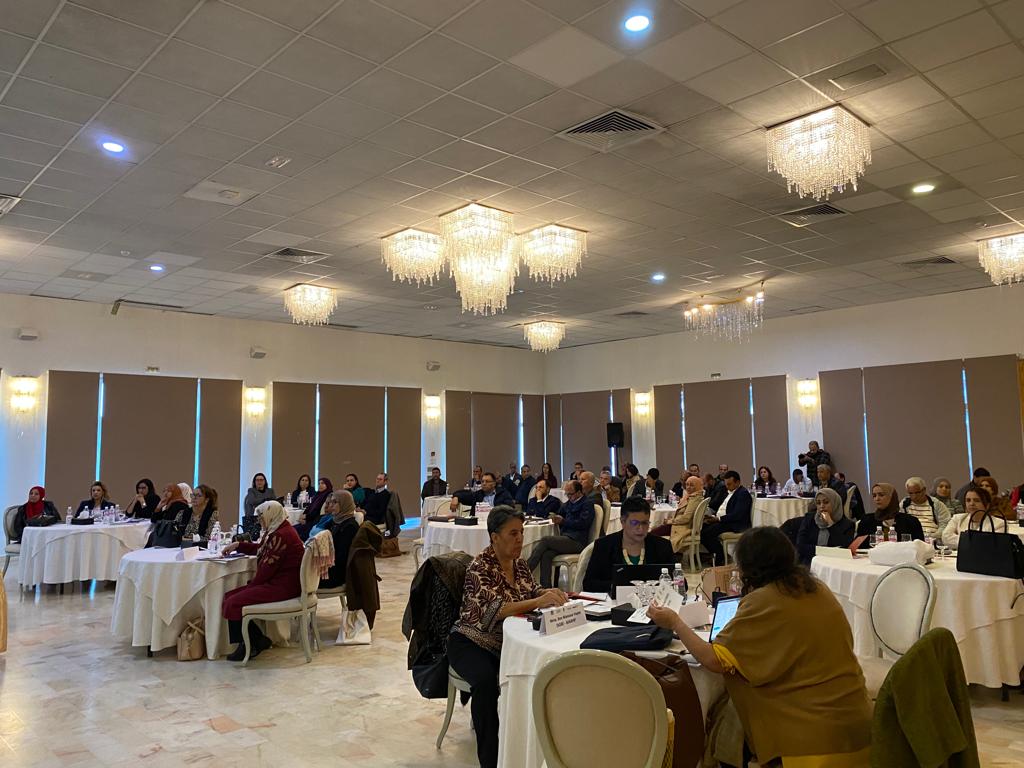
The National Conference was a milestone for the first cycle of work of AIP WACDEP-G.
Key takeaway messages
Participants confirmed their commitment to adopting a gender transformative approach in their respective lines of work. WACDEP-G has been most important in this direction by the dual process of (i) capacitating key institutions and (ii) assisting with the gradual transformation of water and climate policies for gender equality. They also expressed the need to identify, develop, and implement indicators, criteria or measures against which changes can be assessed and which measure qualitative and quantitative changes towards gender equality in the water sector and climate change.
-------------------------------------------------------------------------------------------------------------
The AIP WACDEP-G support programme constitutes the continuity of the WACDEP programme (2012-2019) which had Tunisia and the North Western Sahara Aquifer System among the beneficiary countries and basins. It builds on the findings of WACDEP, while placing emphasis on the gender dimension, aiming to ensure that the preparation, development, design, governance, and management of ongoing and new climate resilient water infrastructure investments, institutions, and job creation interventions strategically advance gender equality. The overall objective is to transform gender inequalities at scale by promoting gender-transformative planning, decision-making and institutional development for climate resilient water investments in Africa. AIP WACDEP-G is implemented under the leadership of the General Directorate of Water Resources, Ministry of Agriculture, Hydraulic Resources and Fisheries, Republic of Tunisia, while the first three years of implementation (2020-2022) are supported financially by the Austrian Development Agency (ADA).
